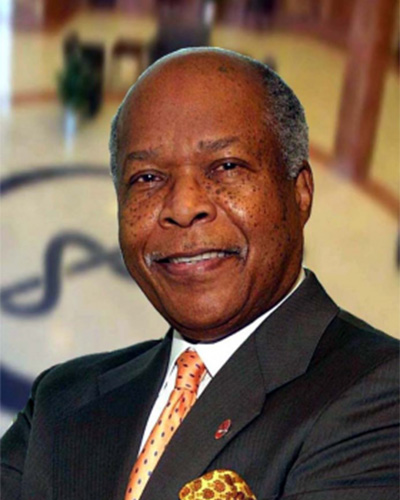Opinion: Memories of That March Toward a "More-Perfect Union"
MSM President Emeritus and Founding Dean Louis W. Sullivan, MD, reflects on the 1963
March on Washington
and how it aligned the purpose of thousands to pursue equality.
By Louis W. Sullivan, MD
 Louis W. Sullivan, MD
Louis W. Sullivan, MD
MSM President Emeritus and Founding Dean
Published in the Atlanta Journal-Constitution, August 28, 2023
This week, my wife Ginger and I are remembering the "March on Washington for Freedom and Justice." This event occurred 60 years ago, led by A. Phillip Randolph and civil rights leaders, including Rev. Martin Luther King Jr.
All of us went to Washington in buses, on trains, planes and in cars to participate in this gathering. It succeeded in arousing the conscience of our fellow citizens to achieve a "more perfect union."
As our bus from Boston to Washington crossed the Delaware Memorial Bridge at 5 a.m. August 28, 1963, we were surprised by people on the roadsides with signs expressing their support. The closer we got to Washington, the more people were on the roadsides. When we arrived at the Lincoln Memorial, I noticed that one of our riders, a paraplegic, was remaining on the bus. When I asked why, he said he had "come for the trip but did not want to be a bother." I insisted that he come out to the plaza as we pushed his wheelchair. The crowd spontaneously parted, so we ended up only 30 yards away when Dr. King gave his momentous "I Have a Dream" speech.
Because of Dr. King's eloquence and his call for a more inclusive, democratic, life-affirming culture for our country, I was inspired to make my contribution to these goals. The 250,000 people at the Lincoln Memorial that day were equally inspired.
Almost three years later, King stated, "Of all the forms of inequality, injustice in health is the most shocking and most inhumane." That is the sad reality we and our forebears have faced since the first enslaved Africans arrived at Jamestown in 1619. The phrases and ideals of freedom and equality articulated by the Founding Fathers did not apply to those who were enslaved.
After the end of the Civil War, the Freedman's Bureau was formed to provide education and social services for the newly freed Blacks. Black colleges were organized around the country with support from the Freedmen's Bureau. One was Howard University School of Medicine in 1868, the first medical school in the Unites States for training Black physicians. Fifteen predominantly Black medical schools were formed by the end of the 19th century. Discrimination and/or segregation were present throughout the country. The other 140 medical schools in the United States at that time rarely admitted Blacks.
In 1910 a critique of each US medical school by the educational reformer Dr. Abraham Flexner resulted in closure of many white medical schools and all but two of the predominantly Black medical schools by 1925. This has contributed to the health inequities confronted today by African Americans and other minorities. These inequities led Morehouse College to found Morehouse School of Medicine (MSM) in 1975. Of 47 MD degree-granting US medical schools organized in the second half of the 20th century, MSM is the only one which is predominantly Black. Civil rights initiatives in the 1960s created momentum which supported the development of MSM.
Another institution founded in 1977 is the Association of Minority Health Professions Schools (AMHPS), organized by the leaders of Morehouse School of Medicine, Meharry Medical College (Tennessee), Tuskegee School of Veterinary Medicine (Alabama) and Xavier University College of Pharmacy (Louisiana). AMHPS coordinates the efforts of minority health professions schools to secure federal funds for their programs, as described in "We'll Fight It Out Here," a recent publication from Johns Hopkins University Press.
AMHPS initiatives have increased racial and ethnic diversity among the nation's health professionals. The health status and life expectancies of all Americans have improved. However, the representation of Blacks, Latinos, and Native Americans remains substantially lower in the health professions than in the nation's general population. Inequities in health status and access to health care have also begun to improve.
But the elimination of inequities in health status and further improvement in access to health care will require sustained efforts over the coming years.
The benefits to our nation will be a healthier, happier citizenry, a more productive workforce, a stronger economy, and a more stable society.
At that time, we will have a higher level of humanity in our country, and we will have achieved "a more perfect union."

